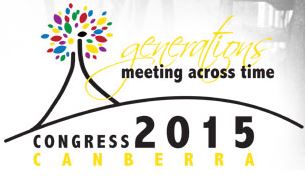 This is the first of three posts on the 14th Australasian Congress on Genealogy & Heraldry, hosted by HAGSOC (Heraldry & Genealogy Society of Canberra) on behalf of AFFHO (Australasian Federation of Family History Organisations). It was a four day conference with two major social events, group meetings and an exhibition area filled with sponsors and exhibitors. I will cover the conference days first and finish with the social events and exhibitors.
This is the first of three posts on the 14th Australasian Congress on Genealogy & Heraldry, hosted by HAGSOC (Heraldry & Genealogy Society of Canberra) on behalf of AFFHO (Australasian Federation of Family History Organisations). It was a four day conference with two major social events, group meetings and an exhibition area filled with sponsors and exhibitors. I will cover the conference days first and finish with the social events and exhibitors.
I did manage one blog post on Diary of an Australian Genealogist during Congress which covered my arrival, collection of satchel and other bits and pieces. Read it here.
Day One started with a very apt presentation by Dr Mathew Trinca from the National Museum of Australia talking about his Italian heritage and how his parents came out separately to Australia. Their stories contribute to Australia’s immigrant heritage and Mathew’s comment that family history should be more entwined with ‘scholarly history’ resonated with everyone. He went on to say that ‘history is personal not dry or academic’ and that ‘events have lasting effects on Australia’. It was a great start to the overall Congress and in hindsight, many of the subsequent talks carried this same message of family history entwined with a wider history of Australia and elsewhere.
I then listened to Cora Num‘s What Can I Find Using E-Records and listen was the operative word as Cora was unable to attend in person. With technology, Congress was able to video record her talk and slides and it was presented as if she was in the room with us. I have heard Cora talk on this topic before but it was quite different as so many new e-records have come online since I heard it a few years ago. Another excellent talk with many useful links which are also listed in her paper published in the Congress proceedings (available on USB or in print, although a rather hefty volume). Cora also has a research guide on the subject, details on CoraWeb.
This might be an opportune time to say that I have both the USB and the print volume of the proceedings. There were four streams so each session I missed three talks which I can at least read in the proceedings. It is never the same as you miss the images shown during the presentation and any anecdotal additions but at least you have it for future reference. The USB was a speaker’s gift but I wanted the print volume for my bookshelf so that I have a full set of conference proceedings since 1977.
My next presentation was Shaun Rohrlach from the National Archives of Australia talking about how they are socialising Australia’s wartime history. He also mentioned their ArcHive project where you can help transcribe records for easier access, Destination Australia where you can add immigrant stories and the Forced Adoptions History Project. For the wartime history aspect, he talked about the Discovering Anzacs website and how you can add your military stories to it.
The keynote after lunch was Roger Kershaw talking about free emigrants to Australasia and what is available at the National Archives UK. There is a search guide to emigration records and they do regular blogs and podcasts. He had some nice cartoons from the Illustrated London News (available through e-resources in the Gale News Vault if you have a National Library of Australia library card).
Then I went to David Rencher talking about FamilySearch talking about some of the new features including how the FamilySearch catalog (their spelling not mine) links to WorldCat and ArchiveGrid which gives you the ability to know what resources are closest to you. Their goal is to put the world’s historical records online in one generation (2014-2044) and to achieve this they have collaborative projects with numerous partners. I suspect I won’t see the finish of the project but the next few years/decade are certainly going to be exciting. I will also have to check out the FamilySearch Memories app (Android versions too) and who knew they had all those other FamilySearch family history apps too including Puzzilla.
The final talk I went to on Day One was Colleen Fitzpatrick talking about her dead horse project which I had already heard at the last Congress in Adelaide. It was not described like that on the program otherwise I would have gone to one of the other sessions. By the time I realised it was too late to get up without disturbing everyone else in the row. I’m not sure that speakers should be allowed to do the same talks at subsequent conferences or if they are, then it should be clearly noted. I was not the only one caught out on this talk.
As I am a glutton for geneapunishment I went to the AFFHO AGM at the end of the day to encourage member societies to participate in National Family History Month 2015. To me publicising your genealogy events in the NFHM web calendar during NFHM is a terrific idea as more people will see the events and maybe attend or even join the society. That has to be a good thing, yet some societies don’t participate. Perhaps I have recruited a few more!
Day Two was another excellent keynote address from Joshua Taylor of Findmypast. He talked about his childhood and how his grandmother took him on all these family history holidays. I wished my grandmother had been the same but all she ever said was ‘don’t do the family history’ and refused to tell me anything and of course there were no photos or documents, until after she was gone. Now they remain unidentified. Such a contrast to Joshua’s uplifting story. Joshua also talked about the power of social media and involving younger generations.
Pauleen Cass was my next choice and it was another excellent talk on the marriage of local and family history and she used her own family to demonstrate how the two together are a bridge to the past. Basically you have your family at the centre surrounded by business, church, school, social, farming and railway (or whatever the key elements were in your family’s area). Later on Pauleen added weather, economy, national and international as our families were impacted by all of these things as well. She finished with the value of One Place Studies and no doubt we will see more of them in years to come.
Another Cora Num presentation on Work Choices (occupations) was humorous and revolved around one of her own families, toilets and sewerage records. She talked abut where to find records and what types of records are available. Again many links to follow up and these are captured in her Congress paper. Cora finished with newspapers and images, both great sources for information and clues.
David Rencher from FamilySearch talking on Irish census and census substitutes was my next choice and he covered numerous resources from different time periods so I will be going back to his written paper. A lot of the resources were back before my ancestors’ time although I still hope to get at least one of my Irish families back to the 18th century.
The afternoon keynote was Richard Reid talking about 19th century Ireland and as usual I really enjoyed his presentation and his slides with some great illustrations. I need to explore the National Library of Ireland‘s digitised images more. Some of my Irish ancestors were illiterate so I was not too surprised when he said that the literacy rates for arrivals in NSW 1848-1870 were only 48% for read and write. Richard said that the Irish children had no way of telling the time so they were ‘just guessing the hours’ to attend school and this might explain some of the non attendance.
At every conference I go to, I like to choose a topic that I have no knowledge of. In this instance it was the Huguenots in Australia so I attended Robert Nash’s session. There is a Huguenot Society of Australia and a number of publications for anyone with Huguenots in the family.
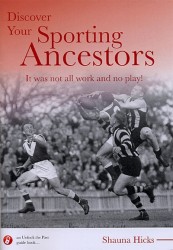 For the final session was no choice as I was giving a talk on discovering sporting ancestors. As it was the last talk for the day and everyone was keen to race off and get beautiful for the conference dinner, I kept it light with lots of images. As usual I have placed my presentation on the Resources page of my website, scroll down to Presentations. This topic is also the subject of my new research guide Discover Your Sporting Ancestors: It was not all work and no play! published by Unlock the Past and available from Gould Genealogy & History.
For the final session was no choice as I was giving a talk on discovering sporting ancestors. As it was the last talk for the day and everyone was keen to race off and get beautiful for the conference dinner, I kept it light with lots of images. As usual I have placed my presentation on the Resources page of my website, scroll down to Presentations. This topic is also the subject of my new research guide Discover Your Sporting Ancestors: It was not all work and no play! published by Unlock the Past and available from Gould Genealogy & History.
Two very full days of excellent presentations and I am yet to read any of the presentations I missed. Days Three and Four will continue in my next blog post.
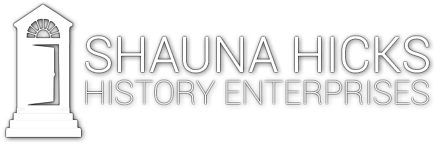
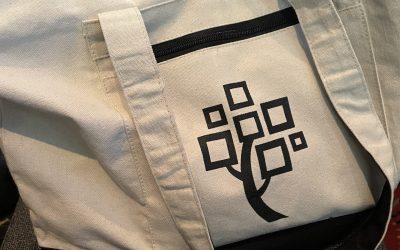
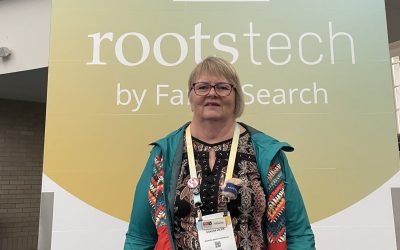
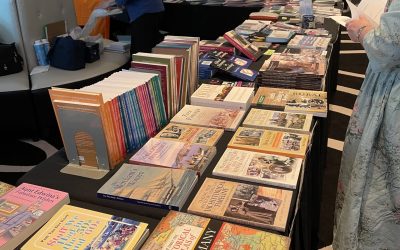
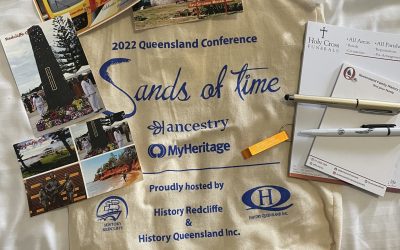
Josh was inspiring wasn’t he? I’m a bit sorry I missed your talk about Sporting Ancestors. I’ll just have to catch up on what I missed by reading the papers 🙂
I and the two people sitting beside me were similarly disappointed to hear the Dead Horse Story repeated at a second Congress.
I hope tge Sydney organisers taltake note of the two overseas speakers who repeated taljs from the last Congress.
Oops wish I could edit the above. Blame typing on phone in car.
Thanks Shauna. I’ve enjoyed reading about the talks you attended that I didn’t and now have a few more papers to read, (I had a fleeting expectation I would read all of them, until like you, I saw the size of the proceedings!). I also love your idea of attending a talk about something you aren’t familiar with. As someone who has only recently started attending family history/genealogy talks I think I am a very long way off looking at a program and thinking that I won’t know much about that topic – at present that is true for me on most (all) topics!
Off to read your next post!
Thanks for the positive comments Shauna! I hadn’t heard the dead horse story so found it interesting but can see it would have been frustrating and annoying if you’d missed something else, having heard the story before. It’s always so difficult to choose which talks to attend.